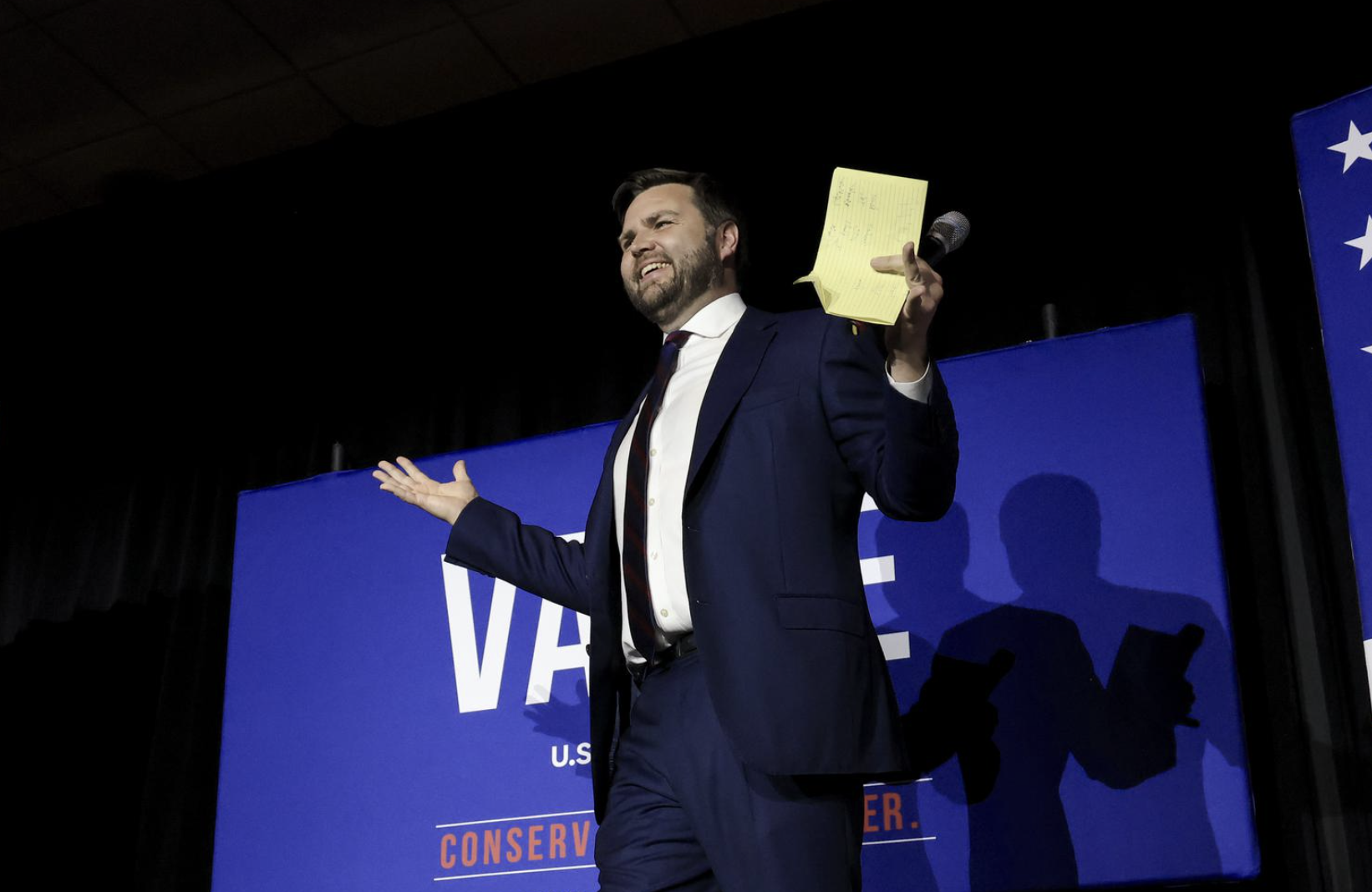
Eyck Freymann: How to Break China’s Minerals Chokehold
Why the allies need a multilateral commercial stockpile This essay is based on a Hoover History Lab working paper, co-authored with Joshua Stinson, William Norris,…
Thought Leader: Eyck Freymann

J.D. Vance’s comfortable victory in Ohio’s Republican Senate primary, combined with Gov. Mike DeWine’s underwhelming showing for a GOP incumbent, reflects the ongoing evolution of the Republican Party from the business-oriented, country-club conservatism of Rob Portman and John Kasich to a blue-collar bulwark against economic decline and cultural elitism. It wasn’t just the top of the ticket: In an upset, Republicans nominated a MAGA-aligned military veteran, J.R. Majewski, who once turned his lawn into a 19,000-square-foot Donald Trump banner, surging past two more-experienced lawmakers to win the nomination in the state’s 9th District.
The divide between the more-prosperous urban and suburban pockets of the state and the working-class areas left behind was evident from Tuesday’s political map. Boosted by Trump’s endorsement, Vance carried most of the rural and small-town counties across the state, performing most strongly in the culturally conservative Ohio River Valley counties in Appalachia, where Trump had greatly outperformed Mitt Romney. Vance also dominated in northeast Ohio’s Mahoning Valley, the home base of Democratic Senate nominee Tim Ryan. The industrial area has fallen on hard times after the disappearance of good-paying manufacturing jobs—recently exemplified by the closure of the Lordstown Chevrolet assembly site.
By contrast, the one Republican Senate contender who didn’t tie himself closely with Trump—state Sen. Matt Dolan—performed well in the urban and suburban parts of the state, carrying voter-rich Franklin County (Columbus) and Cuyahoga County (Cleveland), while coming close to Vance in Hamilton County (Cincinnati) and in the surrounding suburbs of all three big metropolitan regions. But that performance won him only 23 percent statewide, good enough for third place in the crowded primary.
Political analyst Henry Olsen noted that the three biggest metro areas in Ohio cast 21 percent of the Republican primary vote in the 2012 presidential primary, but that vote share dropped to just under 19 percent for this year’s primaries. It’s another data point demonstrating that Republicans are less reliant in Ohio on swing suburban voters, but they’re making significant inroads with working-class voters who voted for Barack Obama twice but have since turned on the Democratic Party over its progressive orientation. Vance’s often-crude campaign message railing against elites undoubtedly resonated with many of these voters who feel left behind—both culturally and economically.
“You heard from J.D. on the campaign trail his focus on bringing back good-paying, working-class jobs that you can support a family on, a skepticism of big multinational corporations that have shipped their jobs overseas and hollowed out small towns in the country like the one I grew up in,” said Sen. Josh Hawley of Missouri, who had given Vance an early endorsement. “There’s a recognizable set of themes and issues there.”
Hawley told National Journal he believes his party’s Senate leadership hasn’t adapted enough to accommodate these converted Republican voters, and that he hopes to count Vance as part of an emerging counterweight to establishment forces within the GOP. “There is a consistent pattern of protest on both sides against the status quo. … A lot of Trump voters were Bernie Sanders voters in the [2016] primary,” Hawley said. “You can’t talk about economics without talking about culture. A lot of these blue-collar voters—one of the reasons they cohere as a class is that their cultural values are under threat.”
Vance himself spent a celebratory postelection appearance on Tucker Carlson’s Fox News show, spending as much time slamming “corruption” in his own Republican Party as he did going after Tim Ryan, his general-election opponent.
It’s no coincidence that Ryan started the general election by trying to turn the tables on Vance, attacking his background as a venture capitalist and Washington celebrity to undermine his working-class credibility and anti-elitist posturing. Vance was, until recently, an outspoken Trump critic who gained attention for an unvarnished look at his hardscrabble upbringing in his acclaimed memoir, Hillbilly Elegy.
Vance, Hawley, and other like-minded conservatives may struggle to construct an ideologically cohesive movement from these newfound GOP voters, described by conservative New York Times columnist Ross Douthat as a “mixture of populists and paleo-conservatives, disaffected voters who didn’t share True Conservatism’s litmus tests and pugilists who just wanted someone to fight liberal cultural dominance.” Much of the energy of the movement is fueled by negative attacks against a perceived corrupt elite of big corporations, traditional media, and academia, without offering a constructive path for those left behind.
Indeed, outside of Trump, who were Vance’s most relied-upon surrogates in the final days of the competitive Senate campaign? Reps. Marjorie Taylor Greene and Matt Gaetz, lawmakers who are emblematic of a right-wing celebrity culture more than any high-minded agenda to improve the fortunes of the working class. When I asked Hawley how the ideals of his populist conservatism square with the lower-brow appeal of Greene and Gaetz, he said: “I don’t really want to answer that question, to be honest with you. And it’s nothing against those folks, but I can’t say that I’ve followed them.”
That’s why it will be difficult for this populist brand of conservatism to succeed outside of red states like Ohio and Hawley’s home state of Missouri. Ohio was a onetime swing state that has moved away from the Democrats since Trump’s political ascension. But other battlegrounds with larger urban and suburban electorates, like Arizona and Georgia, have moved in the opposite direction.
Vance is now a solid favorite to win the general election, even if his pugilism alienates persuadable suburban voters who still make up a sizable chunk of the Republican electorate. It would take an epic collapse to fall short in this political environment in a state that Trump carried by 8 points. The more telling test of the viability of the movement will be in Arizona, where another Hawley-endorsed (and Peter Thiel-backed) candidate, venture capitalist Blake Masters, is running on many of the same themes as Vance, but in a true battleground state.
Eyck Freymann: How to Break China’s Minerals Chokehold
Why the allies need a multilateral commercial stockpile This essay is based on a Hoover History Lab working paper, co-authored with Joshua Stinson, William Norris,…
Thought Leader: Eyck Freymann
Chris Miller: Robotics Manufacturing: The Rise of Japan
“To the Americans, a robot is a computer attached to a mechanism. To Japanese, a robot is a mechanism attached to a computer.” The future…
Thought Leader: Chris Miller
Dr. Sanjay Gupta: A New Understanding of Parkinson’s Disease
Parkinson’s disease, a progressive movement disorder whose hallmark is damage to the dopamine-producing neurons in the brain, afflicts almost 12 million people worldwide. And the…
Thought Leader: Sanjay Gupta

